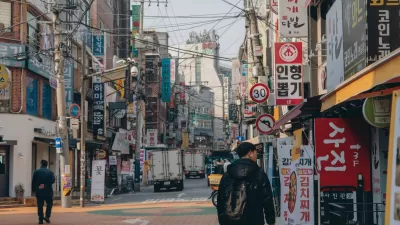With South Korean officials set to move into their sparkling new "mini capital" next month, Chico Harlan examines plans for the new city that "will either drive growth outside the overpopulated capital or end up as an ill-conceived waste of money."
Not to be confused with New Songdo City, the green business hub outside of Seoul, the plan for $20 billion Sejong City is for the "built-from-scratch bureaucrat's paradise" to help reduce the economic gap between Seoul and the rest of the country.
With a population expected to reach 500,000 by 2030, Sejong City is
intended to function as a mini-capital with 36 governmental ministries
and agencies relocating there from Seoul. The plan isn't without its
critics though, including former prime minister Chung Un-chan, who
believes, "It will be almost paralyzing for government operations."
According to Harlan, "Politicians have tried, with little success, to feed growth in
farther-flung regions, with tax incentives and a plan for 10 "innovation
cities" as breeding grounds for industry and private research."
"'There
have been, like, 500 policies to help re-balance the country, and they
have all failed,' said Yook Dong-il, a professor at Chungnam National
University, a 15-minute drive from Sejong. 'But they have all been
micro-policies, nothing as big as the plan with Sejong.'"
Thanks to Daniel Lippman
FULL STORY: With new Sejong City, South Korean government aims to rebalance power

Planetizen Federal Action Tracker
A weekly monitor of how Trump’s orders and actions are impacting planners and planning in America.

Restaurant Patios Were a Pandemic Win — Why Were They so Hard to Keep?
Social distancing requirements and changes in travel patterns prompted cities to pilot new uses for street and sidewalk space. Then it got complicated.

Map: Where Senate Republicans Want to Sell Your Public Lands
For public land advocates, the Senate Republicans’ proposal to sell millions of acres of public land in the West is “the biggest fight of their careers.”

Maui's Vacation Rental Debate Turns Ugly
Verbal attacks, misinformation campaigns and fistfights plague a high-stakes debate to convert thousands of vacation rentals into long-term housing.

San Francisco Suspends Traffic Calming Amidst Record Deaths
Citing “a challenging fiscal landscape,” the city will cease the program on the heels of 42 traffic deaths, including 24 pedestrians.

California Homeless Arrests, Citations Spike After Ruling
An investigation reveals that anti-homeless actions increased up to 500% after Grants Pass v. Johnson — even in cities claiming no policy change.
Urban Design for Planners 1: Software Tools
This six-course series explores essential urban design concepts using open source software and equips planners with the tools they need to participate fully in the urban design process.
Planning for Universal Design
Learn the tools for implementing Universal Design in planning regulations.
Heyer Gruel & Associates PA
JM Goldson LLC
Custer County Colorado
City of Camden Redevelopment Agency
City of Astoria
Transportation Research & Education Center (TREC) at Portland State University
Camden Redevelopment Agency
City of Claremont
Municipality of Princeton (NJ)





























